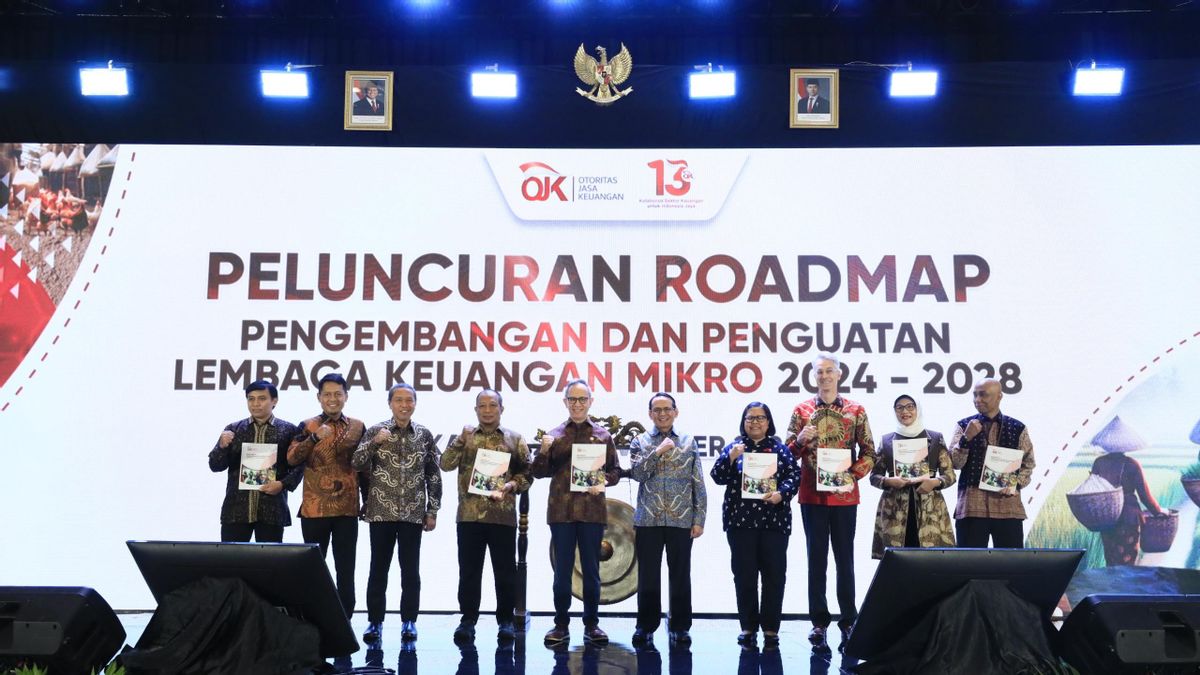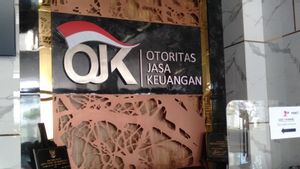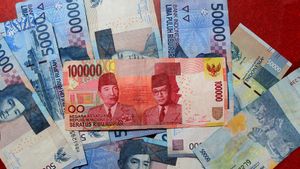JAKARTA - The Financial Services Authority (OJK) officially launched the Roadmap for Micro Financial Institution Development and Strengthening 2024-2028 (Roadmap LKM) as an effort to continue to strengthen the financing of the micro segment and the community's economy.
Chairman of the OJK Board of Commissioners Mahendra Siregar said that the LKM roadmap is a guide for all stakeholders at LKM regarding the vision and direction of development and strengthening of LKM Indonesia in the next five years.
Mahendra said his party would continue to strive to support efforts to improve and strengthen the micro-financial ecosystem, including through the issuance of this LKM roadmap.
"Because we understand that by saying that we can build healthy microfinance, which is sustainable, which can achieve its goal of increasing inclusion, to increase economic growth and of course improve people's welfare can really be achieved well," Mahendra said in his statement, Monday, November 25.
Meanwhile, Chief Executive of Financing Institutions, Venture Capital Companies, Micro Financial Institutions and Other Financial Services Institutions Agusman said the roadmap is expected to make LKM a trusted institution in the micro segment, actively support government programs and contribute to community empowerment, and consumer protection based on good corporate governance principles.
"Management links still have to be tidied up, we have to strengthen human resources skills, then human resources capacity, as well as of course how we have to make funding better. We hope that the roadmap that we have compiled, as our joint commitment, will be able to increase financial inclusion, and be supported by all of us, both the government, associations, and all stakeholders," said Agusman.
The implementation of the LKM Roadmap is carried out through three main phases in the period 2024 to 2028, starting from the strengthening and consolidation phase (2024-2025), the phase creates momentum (2026-2027), to the growth and adjustment phase (2028).
Agusman said that the LKM roadmap was supported by four key pillars of development and strengthening in determining the strategy to be implemented in order to achieve the LKM industrial vision, namely:
- Pillars of governance, risk management, and institutions;- Pillars of empowerment, education and literacy of consumers and the public;- Pillars of development and strengthening elements of the ecosystem; and- Pillars of strengthening regulation, supervision, and licensing.
The five main strategies for developing and strengthening LKM that will be implemented include:
1. Strengthening governance, risk management, and human resources in order to create an LKM industry that has good corporate governance, reliable risk management and human resources. 2. Strengthening of regulation, supervision, and licensing in order to increase the effectiveness of regulation, supervision, and licensing to support a healthy and integrity LKM industry. 3. Strengthening empowerment, education, and literacy of consumers and the public to realize empowerment, education, and effective consumer and community literacy in order to increase trust in LKM.4. Development of ecosystem elements in order to form an ecosystem needed by LKM includes increasing government role, so that LKM can grow faster and healthier. 5. Development of data infrastructure and information systems in order to provide adequate data infrastructure and information systems so that LKM operations and monitoring processes run optimally.
Along with the launch of the LKM Roadmap, OJK also said that currently the RPOJK changes are being made regarding LKM. The preparation of the RPOJK LKM amendment is the implementation of the mandate of the provisions of Law Number 1 of 2013 concerning Micro Financial Institutions as amended by Law Number 4 of 2023 concerning the Development and Strengthening of the Financial Sector.
Dalam perubahan POJK LKM tersebut akan mengatur antara lain mengenai penyelompokan skala usaha LKM menjadi skala usaha kecil, menengah, atau besar dengan kriteria tertentu, penilaian kualitas pinjaman dan penyisihan penghapusan pinjaman, serta pengaturan tingkat kesehatan LKM dengan aspek tertentu. Diharapkan POJK LKM tersebut dapat segera promulangkan.
SEE ALSO:
Currently, the types of LKM businesses operating in the community consist of LKM formed by government institutions such as Micro Waqf Bank, Mandiri Rural National Community Empowerment Program (PNPM), Rural Agribusiness Business Development Program (PUPAP), Village Credit Agency and District Credit Company (PDPK). This program was developed to expand the reach of government-owned regional financial institutions to areas that have not been served by BPR.
In addition to LKM from government programs, there are also LKM established by other communities and institutions such as Village-Owned Enterprises, Baitul Maal wa Tamwil, Baitul Tamwil Muhammadiyah, Bumdesma, Joint Business Groups, Multi-Business Cooperatives, Sharia Financing Savings and Loans Cooperatives, Village Financial Institutions, District Financial Institutions, and Village Economic Empowerment Institutions.
Based on data from August 2024, it shows that there are 253 LKM throughout Indonesia consisting of 174 conventional LKM and 79 Islamic LKM with total assets of IDR 1.64 trillion growing on an annual basis of 9.73 percent.
The English, Chinese, Japanese, Arabic, and French versions are automatically generated by the AI. So there may still be inaccuracies in translating, please always see Indonesian as our main language. (system supported by DigitalSiber.id)












